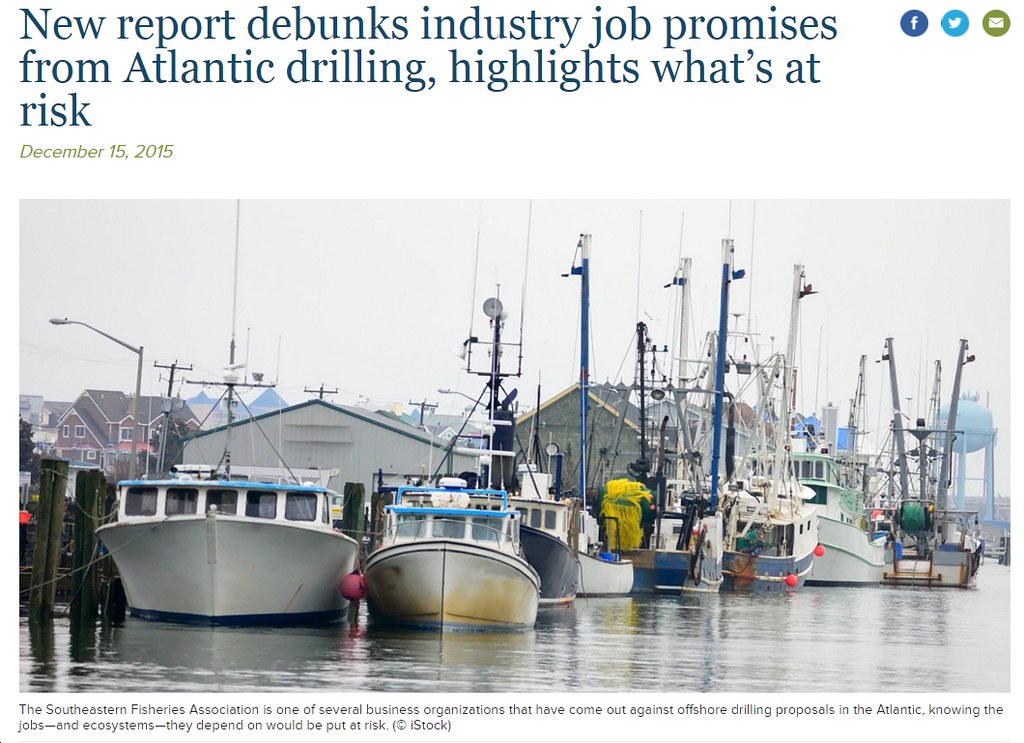You might not remember the 2013 report, “The Economic Benefits of Increasing U.S. Access to Offshore Oil and Natural Gas Resources in the Atlantic?”, but the oil industry (for which that report was prepared; note that it’s hosted on the American Petroleum Institute’s website!) certainly does. In fact, as the Virginian-Pilot points out, that oil industry “study” (in quotes because seriously? does anyone think a “study” by the very same industry whose interests it serves has any credibility whatsoever?!?), “has often been cited by supporters of an Obama administration plan to open much of the Atlantic coast to offshore drilling,” claiming that “states along the coastline, including Virginia, would share in the creation of as many as 280,000 new jobs and stand to gain tens of billions of dollars in leasing revenue.”
Again, if you believe “studies” about the benefits of oil drilling BY THE OIL INDUSTRY (or about the supposed beneifts of coal mining by the coal industry or whatever), then you might also buy that old line about the word “gullible” not being in the dictionary. LOL Seriously, though, I’m glad to see there’s now a formal demolition of that piece of oil sludge, in the form of this study, “The Economic Effects of
Outer Continental Shelf Oil and Gas Exploration and Development in the South Atlantic Region: Issues and Assessment.” Oh, and before anyone runs off with the crazy false equivalencies: no, there’s no comparison between a “study” by the extreme lucrative, for-profit fossil fuel industry on the one hand; and the non-profit, utterly non-lucrative, underfunded environmental advocacy community. And really, anyone who draws such a false equivalency is just throwing out red herrings to distract from how morally compromised the fossil fuel industry and its shills are.
With that, here are a few key findings from the new study, by the Middlebury Instititute of International Studies at Monterey for the Southern Environmental Law Center. Note that when you read “Quest,” you should substitute the words “American Petroleum Institute” or “API,” since that’s much more to the point.
- The API/Quest “study” “was based on an incomplete and misleading economic picture, which resulted in
overstating the likely regional economic effects of offshore oil and gas exploration and development.” - The API/Quest “study” contains employment estimates that “are likely exaggerated.”
- The API/Quest “study” “fails to disclose key assumptions about the location of support activities such as
equipment manufacturing and does not distinguish between oil- and gas-related economic activities
taking place in the South Atlantic and those based outside the region.” - The API/Quest “study” “was prepared before the Department of the Interior released its leasing proposal
in 2015, and is therefore based on scenarios that assume significantly more leasing in the near
term than will actually be undertaken in the Department of Interior’s still preliminary plans.” - The API/Quest “study” “assumes that Atlantic drilling can take place in all federal waters, but the Department
of the Interior is proposing to limit oil and gas activity to areas off the coasts of Virginia,
North Carolina, South Carolina, and Georgia, and has proposed a 50-mile buffer from the
coastline within which drilling would be prohibited.” - The API/Quest “study” “fails to acknowledge the long history of
difficulty of establishing revenue sharing in Congress.” - The API/Quest “study” ignores threates to Virginia’s ocean-oriented economy; in fact, the total number of jobs in that economy” are “larger than the number of oil and
gas jobs estimated by Quest for 2035,” and would be threatened by “onshore industrialization,
routine contamination,
construction
activities, and the threat
of major oil spills” associated with offshore oil drilling activity.




 Sign up for the Blue Virginia weekly newsletter
Sign up for the Blue Virginia weekly newsletter





